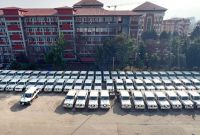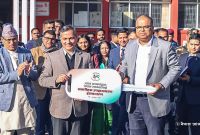Did China Unleash a Water Bomb in Nepal? Ambassador Chen Song’s Silence Sparks Fury

At least eight people were killed and over two dozen others went missing after the Bhote Koshi River, swollen by a sudden surge of water from across the Himalayas, tore through the Friendship Bridge linking China and Nepal on July 8. Officials said torrential rains in Tibet caused a glacial lake to overflow, unleashing a deluge downstream; yet many Nepalese remain unconvinced that this disaster was purely natural.
Weather forecasting experts agreed that there had been no heavy rainfall in Nepal’s own catchment areas in the preceding 24 hours, fueling suspicion that water had been released without warning from upstream reservoirs. Facebook user Bimal Thakur lamented that the Lhendekhola’s sudden rise “had nothing to do with rain here,” questioning why Kathmandu’s Department of Hydrology and Meteorology and the National Disaster Risk Reduction and Management Authority could not immediately pinpoint the cause.
The notion of dams as “water bombs” has taken on new urgency after China announced plans last month to build the world’s largest hydroelectric project in Tibet—an undertaking experts warn could become a weapon if operators discharge water indiscriminately. Such concerns echo across border communities, where memories of unannounced releases from upstream projects have long haunted riverside villages.
Kathmandu’s disaster authorities initially attributed the flash flood to an overflowing glacial lake, but offered no definitive proof, leaving families of the missing in limbo. Repeated requests for comment sent to the Chinese Embassy in Kathmandu have gone unanswered, and Ambassador Chen Song himself has maintained an uncharacteristic silence in the face of these grave allegations.
That restraint stands in stark contrast to Chen’s past flamboyance. On June 21, 2023, he publicly declared Nepal’s Pokhara International Airport a flagship project of China’s Belt and Road Initiative—insisting it “embodied the quality of Chinese engineering” at a well-publicized ceremony. Mere months later, on May 29, 2024, he unleashed a sharp retort on X.com when a journalist challenged the loan terms for that very airport, demanding an apology and accusing the reporter of “worst lies I ever saw”.
In July 2024, Chen even waded into a rescue mission on the Trishuli River, urging search teams to “find the magnet” needed to recover lost buses and bodies—a comment that drew rebuke from rights activists who called it “unprofessional” and insensitive. Critics now wonder whether the same man who so eagerly interjected himself into Nepali affairs can muster a single word to explain this devastating flood.
Diplomatic insiders and civil society leaders warn that Chen’s erratic interventions—and now his deafening silence—have weakened trust in Beijing’s commitment to Nepal’s safety and sovereignty. With trade routes severed and dozens still unaccounted for, the crisis has laid bare a glaring divide between China’s grand infrastructure ambitions and Brussels-style assurances that “nothing to worry about” can sometimes ring hollow on the ground.
Victims’ families, opposition lawmakers, and journalists are demanding that Kathmandu summon Ambassador Chen for an urgent briefing. They want clear answers: Was this flood the result of natural forces or a deliberate water release? If it was a controlled discharge, why were local authorities kept in the dark? And most pressingly, will China accept responsibility for the human and economic toll of what many are now calling a “hydrological assault”?
As floodwaters subside and the search for the missing enters a critical phase, Nepal finds itself at a crossroads. Will Chen Song break his silence to address these “water bomb” allegations, or will the void of explanation leave Sino-Nepalese ties adrift, with trust washed away by the very rivers meant to unite two neighbours?
Sharp Power




![From Kathmandu to the World: How Excel Students Are Winning Big [Admission Open]](https://nepalaaja.com/index.php/img/70194/medium/excel-college-info-eng-nep-2342.jpg)


